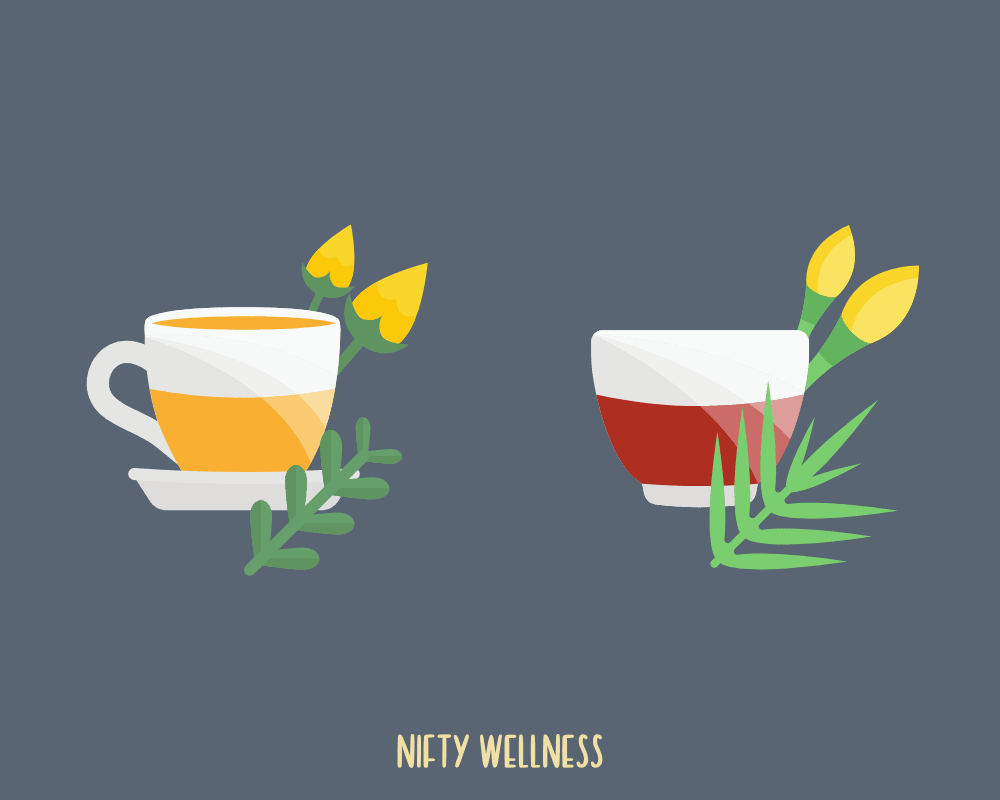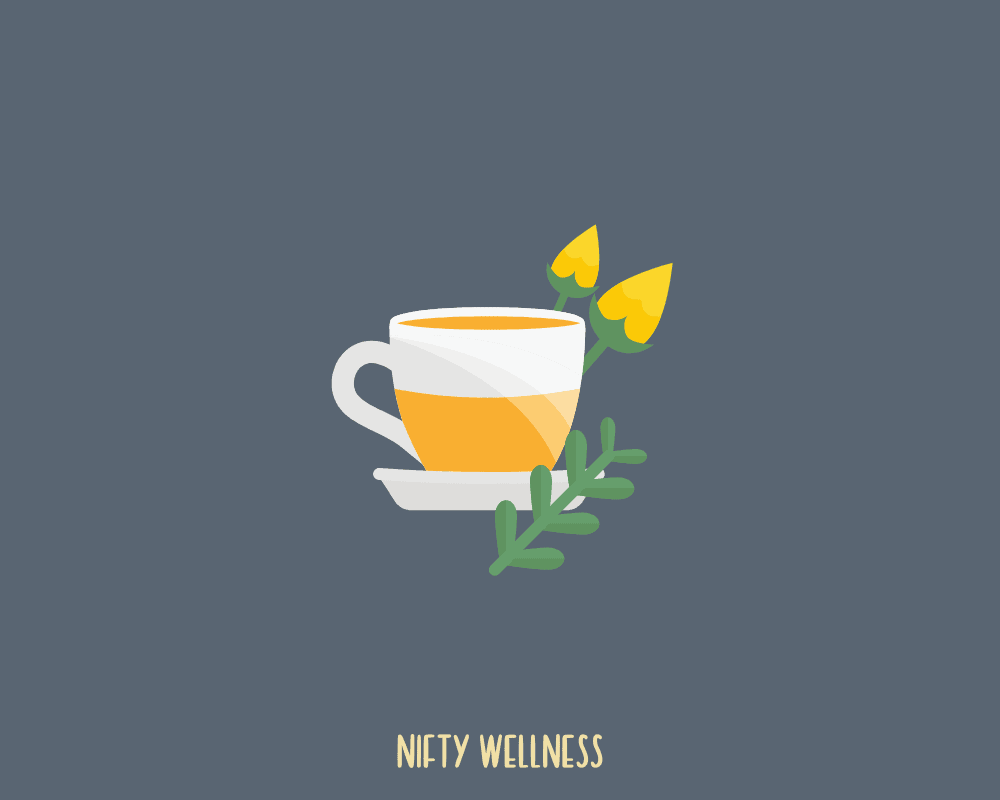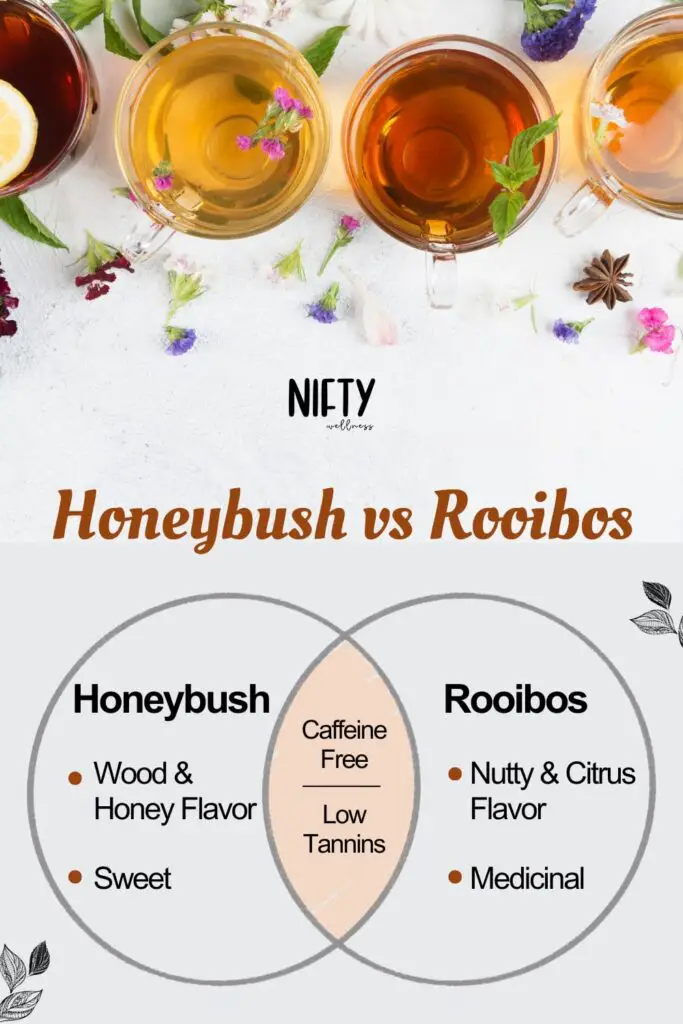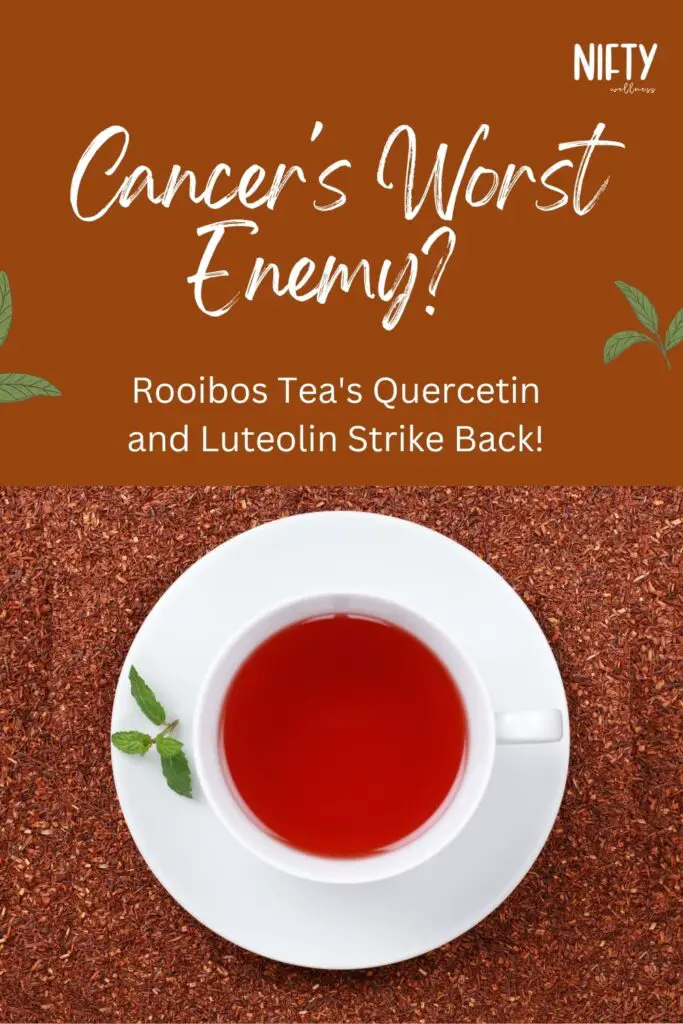Many people wonder what the difference is between honeybush and rooibos tea. While the two teas look similar, there are plenty of distinctions.
In this article, we’ll highlight the similarities and differences between the two in terms of how they taste, and how they affect your health.
Delving into the world of herbal infusions, the comparison between Honeybush and Rooibos unfolds a journey of distinct flavours, health benefits, and aromatic delights. In the realm of herbal teas, the choice between Honeybush vs Rooibos sparks a flavorful debate, each boasting unique qualities that cater to diverse tastes and wellness preferences. Join us as we explore the nuances of these caffeine-free infusions, examining their health benefits, taste profiles, and more to guide you in selecting the perfect cup for your tea-drinking pleasure.
What Are Honeybush & Rooibos?


Honeybush and rooibos are both natural, caffeine-free teas indigenous to South Africa. Both teas are low in tannins—a chemical compound found in many teas, wines, coffee, and chocolates, it belongs to a larger group of compounds called polyphenols.
Tannins have a bitter, astringent flavor, and because these teas have low tannin levels, they can steep for a long time without becoming bitter. Both honeybush and rooibos are also rich in antioxidants.
About Honeybush

Honeybush, or Cyclopia intermedia, is an herb plant with woody stems and a low ratio of leaves to branches, which is found only in the Western and Eastern Cape provinces of South Africa.
The plant’s leaves differ in shape and size but are typically thin and broad. Honeybush leaves oxidize after being cut, which alters their flavor. The leaves become a deep, brown color and produce a sweet woodsy flavor with dark fruit notes.
During the flowering season, the bush yields clusters of yellow flowers with the distinctive smell of honey, thus the name.
Check out our full article about honeybush tea.
About Rooibos

Rooibos, or Aspalathus linearis, is a shrub-like plant grown only in the Western Cape province. The bush has a central stem from which offshoots of branches grow, each carrying needle-like leaves.
The rooibos plant can grow up to 2 meters high in its natural state but is typically cut when it reaches between 0.5-1.5 meters high.
The rooibos bush leaves are either cut and oxidized to produce red rooibos or left un-oxidized to create green rooibos.
Check out our latest blog The Best Loose Leaf Tea for Beginners. Unveil the true essence of tea craftsmanship. Elevate your tea ritual today.
Differences In Taste Between The Two


Both honeybush and rooibos are delicious caffeine-free teas with slightly sweet undertones.
Honeybush tea tastes similarly to how it looks: a sweet, full-body tea with undertones of wood and honey. The tea is pink in color and has a pleasant flavor.
Rooibos, on the other hand, has an earthier, slightly nutty flavor. Because green rooibos does not oxidize, it tends to have a fresher, greener, almost citrus taste. For some, red rooibos may taste slightly medicinal.
Health Benefits Of Honeybush

Honeybush tea contains trace amounts of several minerals, including iron, potassium, calcium, copper, zinc, magnesium, manganese, and sodium. But what are some of its health benefits?
Beyond its mineral-rich composition, honeybush tea has extraordinary health benefits. Packed with polyphenol antioxidants like xanthones and flavanones, this tea has been celebrated since the 19th century for its potent anti-inflammatory, antitumor, antiviral, and antimutagenic effects. Let’s explore some honeybush health benefits.
Source of Antioxidants
Since the beginning of the 19th century, honeybush has been revered for its high antioxidant content—it contains one of the highest known antioxidant levels in the tea world!
Antioxidants protect the body against oxidative stress and are crucial in a healthy, disease-fighting diet. Honeybush contains the polyphenol antioxidants xanthones and flavanones.
Like other types of polyphenols, these antioxidants have been found to have potent anti-inflammatory, antitumor, antiviral, and antimutagenic effects, protecting the body against the onset of serious diseases such as cancer, Alzheimer’s, dementia, and more.
Improves Skin Health
Drinking honeybush tea also proves to be beneficial for the skin. In addition to its antioxidants (that can prevent skin damage, fight inflammation, and combat signs of aging), its fermented leaves may also possess anti-aging properties.
A 2016 study found that honeybush’s fermented leaves and stems could protect the skin against damaging ultraviolet B rays, the UV radiation that most commonly causes skin cancer.
Prevents Heart Disease
Honeybush’s polyphenol content may also be beneficial for heart health and preventing heart disease. Numerous studies have shown promising results linking an increased intake of polyphenols to a decreased risk for cardiovascular disease.
One reason for this is that they reduce oxidative stress and, for the heart, keep blood platelets from clumping. Polyphenols also inhibit LDL cholesterol while boosting HDL cholesterol.
LDL cholesterol, known as “bad cholesterol,” builds up in the arteries, increasing one’s risk of blood clots, stroke, and heart attacks. HDL, known as “good cholesterol,” helps rid the body of excess cholesterol, preventing it from building up in your arteries.
Anti-diabetic

Type 2 diabetes (the most common type of diabetes) is a metabolic disease that affects how your body uses insulin.
Several studies have shown that honeybush could help prevent, manage, and treat type 2 diabetes. One component of this could be pinitol, an anti-diabetic agent found in the plant.
The polyphenols in honeybush tea may also help reduce one’s risk of developing type 2 diabetes.
One study found dietary polyphenols beneficial in managing and preventing type 2 diabetes, partly by their ability to control dietary starches’ breakdown into simple sugars that raise blood sugar.
Health Benefits Of Rooibos
Like honeybush tea, rooibos contains high antioxidant levels that make it a beneficial tea for preventing free radical damage.
Rooibos tea is also a rare natural source of the antioxidant aspalathin, which shows strong anti-diabetic potential. Aspalathin can reduce insulin resistance and balance blood sugar levels for those who have or are at risk for type 2 diabetes.
Antioxidants in Green Rooibos
While honeybush may have the most antioxidants, green rooibos is not far behind, containing polyphenol flavonoids, rutin, orientin, quercetin, luteolin, and much more.
Because oxidation causes tea leaves to lose some of their antioxidants, green rooibos contains more antioxidants than red.
Anti-Inflammatory

Due to its high antioxidant content, rooibos tea has powerful anti-inflammatory properties.
Inflammation in the body can lead to bloating, allergies, acne and skin irritation, headaches, poor digestion, arthritis, and is often the root cause of many diseases.
The antioxidant quercetin found in rooibos tea is known for fighting inflaming free-radical damage and oxidation.
Cancer-Fighting

Rooibos tea may be beneficial in preventing and treating cancer. Two of rooibos’ antioxidants: quercetin and luteolin, have been studied for their ability to kill cancer cells.
In labs, quercetin has decreased tumor growth and prevented metastasis or when cancer spreads to other parts of the body.
Heart Health
Another incredible benefit of rooibos tea comes from the potent antioxidant chrysoeriol.
This phytochemical does wonders for the heart. Chrysoeriol aids in blood circulation, prevents the narrowing and hardening of arteries, reduces blood pressure, and inhibits enzymes that contribute to cardiovascular disease.
Read our blog 3 Awesome Red Sage Root Benefits & Side Effects (Proven). Elevate your well-being with the incredible red sage root benefits
Conclusion
In the realm of caffeine-free teas, the choice between Honeybush and Rooibos unveils a world of distinctive flavours and impressive health benefits. Both hailing from South Africa, these teas boast low tannin levels, making them pleasantly steepable without bitterness. Honeybush, with its sweet, woodsy flavour and antioxidant-rich profile, proves not only delightful to the taste buds but also a powerhouse for skin health, heart disease prevention, and anti-diabetic properties. Rooibos, with its earthy, nutty undertones, stands out for its antioxidant-rich green variant and remarkable anti-inflammatory, cancer-fighting, and heart-healthy attributes. Whether you lean towards the honeyed embrace of Honeybush or the robust nuances of Rooibos, these teas offer a flavorful journey coupled with remarkable well-being benefits.
Frequently Asked Questions (FAQs)
Can I mix Honeybush and Rooibos together for a unique blend?
Absolutely! Mixing Honeybush and Rooibos creates a delightful, unique blend. Combine equal parts for a balanced flavour or adjust to suit your taste. Honeybush’s sweet, woodsy notes complement Rooibos’ earthy, nutty undertones. Experiment and find your perfect blend—personalizing teas is a fun way to enjoy flavours tailored to your liking. Happy sipping!
Are there any known allergies associated with Honeybush or Rooibos?
Honeybush and Rooibos are generally considered safe and do not commonly trigger allergies. However, individual responses vary, and monitoring for any adverse reactions is advisable. If you have plant allergies or concerns, consult a healthcare professional. Always introduce new teas gradually to assess compatibility. Enjoy these caffeine-free options, but prioritize your well-being and seek guidance if needed.
Are there any side effects of consuming these teas?
Generally, Honeybush and Rooibos teas are safe for most people when consumed in moderation. However, excessive intake may lead to potential side effects. These can include digestive issues, such as upset stomach or nausea. Individuals with plant-related allergies should exercise caution. If you have concerns or underlying health conditions, consulting a healthcare professional is wise before making these teas a regular part of your diet.
Do Honeybush and Rooibos teas help with weight management?
If you want to manage your weight, Honeybush and Rooibos teas can be buddies in your quest for a healthy weight. They’re low on calories and a tasty swap for sugary drinks. Sipping on these caffeine-free teas, along with eating well and staying active, adds up to a wellness win. No magic tricks here, just a flavorful way to keep your hydration game strong on the road to feeling good.
Can children and pregnant women safely consume Honeybush and Rooibos?
Yes, both Honeybush and Rooibos teas are generally considered safe for children and pregnant women when consumed in moderation. However, it’s always advisable for pregnant women to consult with their healthcare provider before introducing new herbal teas into their diet. Children should consume caffeine-free versions, and parental discretion is advised. Monitoring individual reactions and seeking professional advice ensures a safe and enjoyable tea experience.
